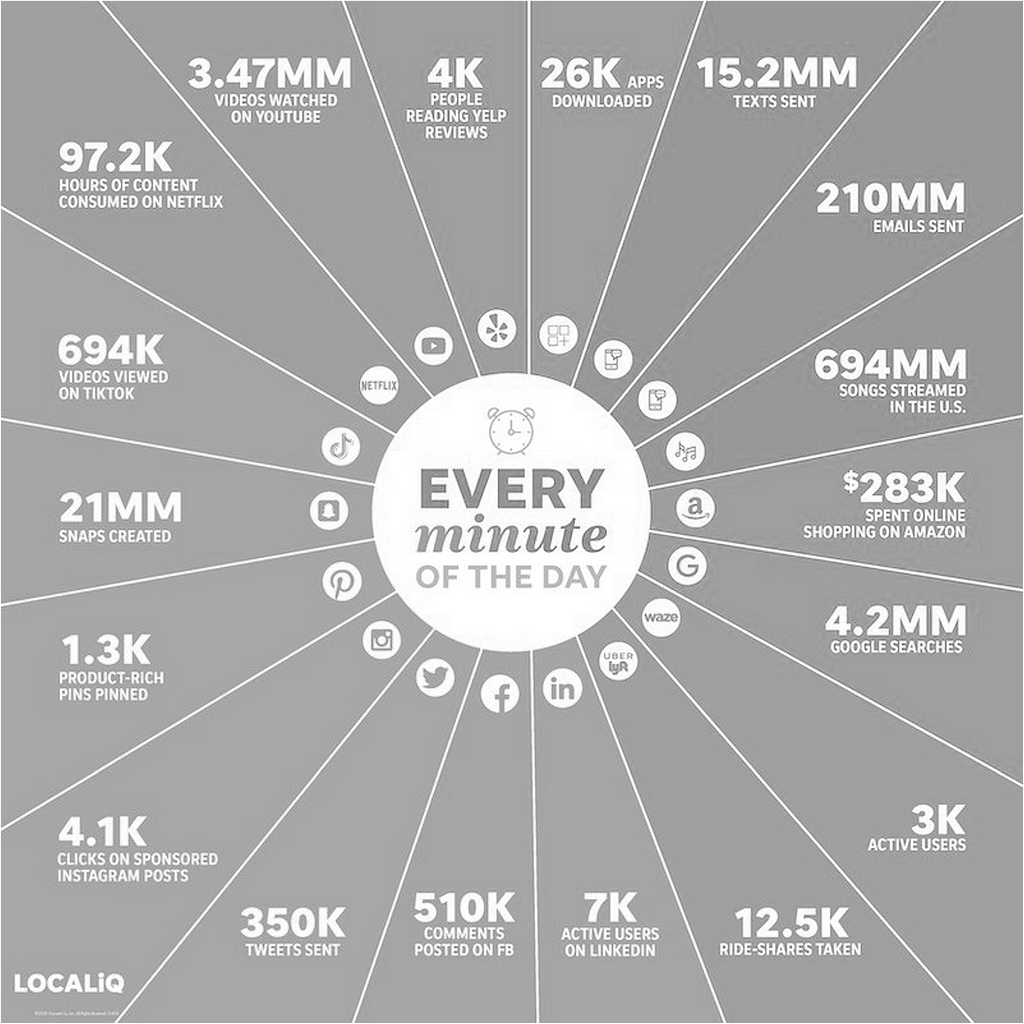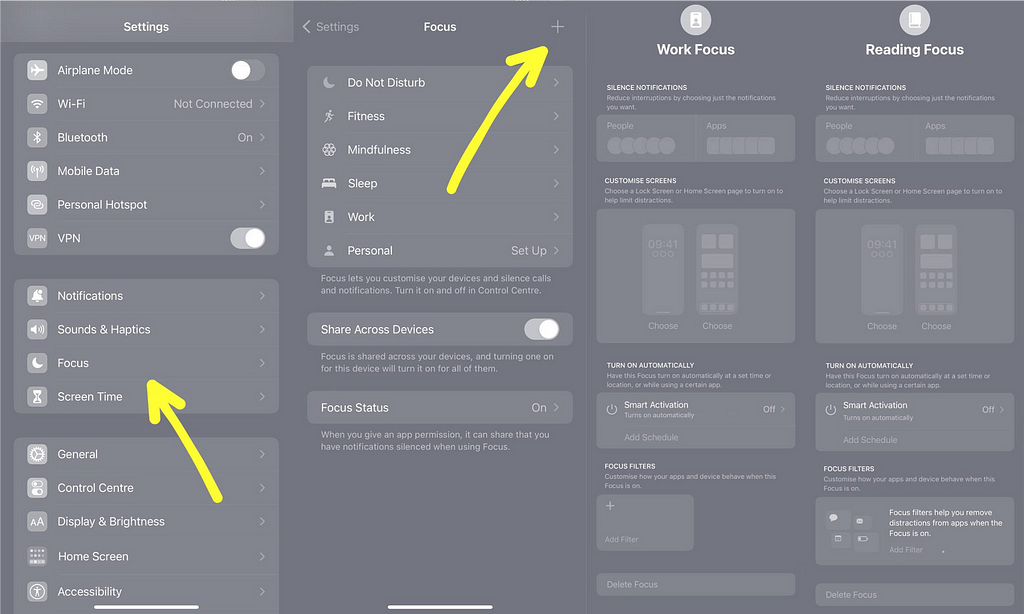CONQUER THE ATTENTION ECONOMY: EXPERT TIPS TO CUT YOUR SCREEN TIME AND LIVE FULLY
Take control of your digital life today! Learn how FB and YouTube manipulate our attention to keep us hooked on social media and get our expert tips to break free from digital slavery!
 Source: © 2023 D&A Partners
Source: © 2023 D&A PartnersWe live in a hyperconnected world where information flows at an unprecedented rate. However, this abundance of information comes at a cost — it consumes a significant portion of our time.
According to the World Economic Forum report, each day, humanity produces an overwhelming amount of data:
- 500 million tweets;
- 294 billion emails;
- 65 billion WhatsApp messages;
- 720,000 hours of new content on YouTube.
Our team often jokes about the digital marketplace, saying, “If you’re not paying for the product, you are the product.” In today’s digital age, the commodity is your attention. Platforms, advertisers, and marketers compete to capture and hold your attention, as it can be converted into direct or indirect income using technology and algorithms.
This constant battle for attention significantly impacts our lives, often leading to distractions, procrastination, and even addiction. Therefore, understanding how the attention economy works is crucial to maintaining focus and productivity in our daily lives.
While the attention economy may seem complex, there are ways to stay focused amidst the digital chaos. In our new piece, we delve deeper into the attention economy and provide tips on maintaining focus and avoiding the pitfalls of the modern information age.
WHAT IS ATTENTION ECONOMICS?
Attention economics is an economic theory that views human attention as a scarce resource. The concept was first proposed by Herbert Simon in 1971, emphasizing the need to manage attention effectively in an information-rich world.
“A wealth of information creates a poverty of attention.” — Professor Herbert A. Simon (1971), winner of the 1978 Nobel Prize in Economics Herbert A. Simon
Herbert A. SimonEconomist Michael Goldhaber coined the term “attention economics”:
- In 1997, speaking at a conference, he used it in place of the term “information economy.”
- Goldhaber argued that brands and celebrities would experience revenue growth as their audience’s attention increases.
Today, people are exposed to an overwhelming amount of information daily, ranging from 6,000 to 10,000 news announcements. However, the human brain cannot process such vast content, making attention the primary currency.
 Source: smartinsights.com
Source: smartinsights.comIf an individual’s attention can be captured, it can be converted into income. This relevance is increasing as businesses aim to capture their target audience’s attention and convert it into revenue.
ATTENTION EQUALS SALES
The research shows that your attention can make a significant impact on sales. Just consider the following findings:
- A study by Lumen found that even a glance at an ad for just three seconds can lead to a conversion rate of 50%.
- According to Dentsu’s research, the more attention you give to an ad (measured in pixels viewed), the higher the chances you’ll end up purchasing the advertised product.
So, the bottom line is this: Your attention matters! And the more attention you give to ads, the more likely it is that companies will see a positive return on their investment.
ATTENTION RETENTION TECHNIQUES
The battle for our attention is fierce, and companies are using special algorithms to interact with the human psyche in order to win it. Here are some attention retention techniques they use.
Ludic Loops
Have you ever been scrolling endlessly on Facebook or YouTube without realizing it? That’s because these platforms have mastered special mechanisms designed to keep users coming back for more:
- Facebook uses notifications personalized to each user’s interests, encouraging them to return to the site to see what’s new.
- YouTube’s auto-play feature keeps users engaged by launching the next video immediately after the previous one.
 Natasha Doe Schull
Natasha Doe SchullImitation and solidarization
In the attention economy, algorithms manipulate our human needs and desires to keep us engaged:
- Social media platforms use our desire to be like others (imitation) and our need to find like-minded people (solidarization) to keep us coming back.
- Our behaviour on these platforms generates data used to create a personalized content space shown to us based on our interests.
- This data is then used for targeted advertising.
Is Attention Economics Dangerous?
Attention economics and its mechanisms are part of the natural evolution of the information society. Humanity has gained access to an unprecedented amount of information and its transmission speed. However, the attentional economy has some serious negative consequences:
- Short digital communication undermines our relationships and reduces empathy.
- Constantly checking our phones impairs attention and cognitive mechanisms, negatively affecting memory and concentration.
- Addiction to social media contributes to stress, loneliness, and an increase in risky behaviour, which can lead to the deterioration of both physical and mental health.
By being mindful of attention retention techniques and using social media and other attention-grabbing platforms in moderation, you can protect your attention and take back control of your digital life.
 Source: © 2023 D&A Partners
Source: © 2023 D&A PartnersHOW TO OVERCOME THE CHALLENGES OF THE ATTENTION ECONOMY?
In the context of the attention economy and the monopoly of social networks, the most valuable skill is maintaining concentration. This is where special applications can help:
- Cold Turkey Blocker (Windows, macOS): This application allows users to create lists of distracting sites and applications and set a blocking schedule. For example, you can limit access to social networks and news notifications during the work day and in the evening — “block” work applications.
- RescueTime (Windows, macOS, Android): The application divides apps into productive, distracting, and very distracting. The user can then block one category or all but the desired category.
- Forest (Android, iOS, Chrome): This app helps you not waste time on your phone. It works simply: when launching the app, the user plants a virtual tree. After that, the gadget needs to be put away for 25 minutes. If you run another app, the tree will die. Forest cooperates with the Trees for the Future Foundation. If you pay for a subscription, your concentration time is converted into funds to plant real trees.
In addition to these apps, some simple but effective techniques to combat the attention economy include:
- Setting clear goals and priorities: Knowing the most important tasks and focusing on them first can help prevent distractions and increase productivity.
- Taking breaks: Regular breaks can help refresh the mind and prevent burnout, leading to better focus and attention when returning to work.
- Limiting screen time: Reducing overall screen time, especially before bed, can improve sleep quality and reduce the negative effects of the attention economy on physical and mental health.
EXTRA TIPS TO FOCUS BETTER WITH IOS 15’S FOCUS FEATURE
OS 15 offers a new feature called “Focus,” which aims to improve productivity and reduce distractions. Here’s how it works:
- Notifications can be filtered based on people or apps, allowing you to receive only the ones you deem important.
- The screen can be customized to hide certain apps or display them based on specific tasks or designs.
- Certain apps are automatically included when you switch to a particular focus mode. For example, selecting the “mindfulness” mode turns on meditation apps, while the “sport” mode opens workout apps. You can also create your own modes and assign specific apps to them.
- Focus filters are available for popular apps like Calendar, Mail, Messages, and Safari, allowing you to control which notifications you receive and from whom. You can also customize which tabs are open in Safari.
 Source: © 2023 D&A Partners
Source: © 2023 D&A PartnersPros:
- The feature can help you stay focused on specific tasks.
- You can customize your screen only to display relevant apps, which is useful when showing your phone to others.
Cons:
- Setting up the feature can be time-consuming and requires motivation.
- Tasks may change, requiring different apps than those assigned to a particular focus mode.
While the feature is promising, it may take time to become mainstream. In the future, Siri could suggest focus modes based on your behaviour, making it even more effective.
Today, many researchers note that we are at the threshold of a new phase of the digital economy. Blockchain and decentralization have spawned such a phenomenon as the “ownership economy.” In the coming years, people will seek not to pay for their attention but to capitalize on it. Catherine SmirnovaThis article was written by Catherine Smirnova of Digital & Analogue Partners. Visit dna.partners to learn more about our team and the services.Be digital, be analogue, be with us!
Catherine SmirnovaThis article was written by Catherine Smirnova of Digital & Analogue Partners. Visit dna.partners to learn more about our team and the services.Be digital, be analogue, be with us!CONQUER THE ATTENTION ECONOMY: EXPERT TIPS TO CUT YOUR SCREEN TIME AND LIVE FULLY was originally published in Coinmonks on Medium, where people are continuing the conversation by highlighting and responding to this story.
